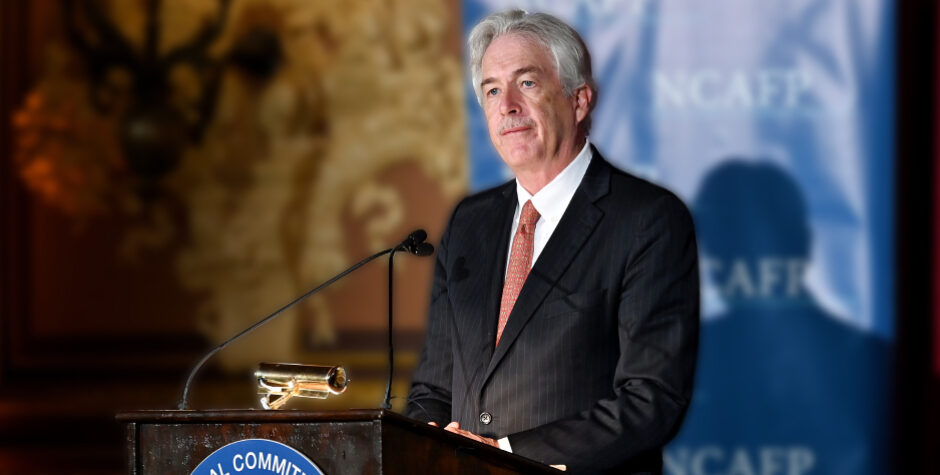GRENELL: Biden CIA Nominee Bill Burns Had My Support Until Troubling Revelations of His Connections with China Surfaced
I originally applauded the decision by President Biden to nominate Ambassador Bill Burns to lead the Central Intelligence Agency (CIA). The idea that an outsider would bring a new perspective to the agency is definitely a goal worthy of support. Burns, a 33-year career foreign service officer, has been a consumer of the CIA’s products long enough to know what is useful for policymakers. His status as someone who hasn’t spent their career inside the intelligence agencies should be the model for Intelligence Community (IC) nominees. But the new revelations about Ambassador Burns' post-diplomatic career are too troubling to ignore. His recent dealings with China, at a time when the Biden Administration has been downplaying the threat from China, are extremely concerning. He isn’t the right person to lead the Central Intelligence Agency at this time.
Intelligence is designed to be an estimate of what we know and believe, and one of its main purposes is to give policymakers and other government officials confidential information, free of bias, to make U.S. foreign policy decisions. The reality of today’s IC analysts is that too many are biased in their writings. The next CIA Director must confront this growing problem and fix it. He or she must also be ready to withstand the phony accusations of political interference when they confront the bias. But the analysts covering Russia and China have drastically different standards that have become a serious impediment to accurate assessments. And the public has lost some confidence in the IC because of the politically motivated leaks. These issues must be dealt with, and I fear Burns’ China bias the last six years is a sign that he won’t be able to properly address this issue.
I received my first intelligence briefing in 2001 and have read tens of thousands of intelligence products since. I came to realize what was nice-to-know information – and what was need-to-know information provided through briefings and reading sessions. As an expert consumer of intelligence, I believe it is imperative that the leaders of the intelligence community be outsiders, people who aren’t biased to the process but accountable for the product. Burns could have been the right fit if, in 2015, he had not started working closely with the Chinese Communist Party, accepting large donations from Chinese businessmen, and urging Congressional staffers to visit China and cozy up to Communist Chinese leaders.
As President of the Carnegie Endowment for International Peace, Burns was paid $540,580 a year, with some of that money coming from the think tank’s Chinese connections. The Daily Caller’s Chuck Ross reported that Burns led Carnegie to accept $2 million in recent years from Chinese interests.
Burns, who has previously served as the U.S. Ambassador to Jordan and to Russia, also led the Obama Administration’s negotiations on the Iranian deal. In light of the new revelations against Burns surrounding China, the Senate must confront Burns’ role in what we have since learned about the Iran deal, too. As Marc Thiessen wrote in 2018, the negotiators were either outmaneuvered or untruthful:
First, President Barack Obama failed to disclose to Congress the existence of secret side deals on inspections when he transmitted the nuclear accord to Capitol Hill. (They were only uncovered by chance when then-Rep. Mike Pompeo (R-Kan.) and Sen. Tom Cotton (R-Ark.) learned about them during a meeting with International Atomic Energy Agency officials in Vienna.) Then, we learned that the Obama administration had secretly sent a plane to Tehran loaded with $400 million in Swiss francs, euros and other currencies on the same day Iran released four American hostages, which was followed by two more secret flights carrying another $1.3 billion in cash. Now, in a bombshell revelation, Republicans on the Senate Permanent Subcommittee on Investigations, led by Sen. Rob Portman (R-Ohio), have revealed in a new report that the Obama administration secretly tried to help Iran use U.S. banks to convert $5.7 billion in Iranian assets, after promising Congress that Iran would not get access to the U.S. financial system — and then lied to Congress about what it had done.
The recent revelations about Burns' post-diplomatic tenure and ties to China should prompt the Senate to reject his nomination. We need an outsider like Bill Burns, but someone who isn’t intertwined with Communist China working in an Administration that has already demonstrated it is vulnerable to Chinese leverage.
Support the work of the ACLJ, as we continue to bring you expert analysis on the issues that matter most.

